The Mediterranean diet has long been lauded as one of the healthiest eating patterns in the world, backed by decades of scientific research and embraced by health professionals for its association with longevity, heart health, and metabolic well-being. Central to this diet are fresh fruits and vegetables, whole grains, legumes, nuts, and, notably, olive oil. However, as interest in the diet grows, so too do questions around specific components: how much olive oil per day in the Mediterranean diet is considered optimal? And what about dairy products like cottage cheese—can you eat cottage cheese on the Mediterranean diet without compromising its health benefits? This article explores the intersection of traditional dietary wisdom and modern nutritional science to offer a clear, evidence-based perspective on how to incorporate olive oil and cottage cheese into a Mediterranean-inspired lifestyle.
You may also like: Plant Based Diet vs Standard American Diet: What the Latest Studies Reveal About Long-Term Health Outcomes
Understanding the Role of Olive Oil in the Mediterranean Diet
Olive oil is more than just a cooking fat in the Mediterranean diet; it is the dietary foundation upon which many meals are built. Often referred to as “liquid gold,” olive oil provides a rich source of monounsaturated fatty acids, primarily oleic acid, which has been associated with reduced inflammation, improved lipid profiles, and decreased risk of cardiovascular disease. Numerous studies, including large-scale clinical trials like the PREDIMED study, have confirmed that a Mediterranean diet with olive oil can reduce the incidence of major cardiovascular events in at-risk populations.
Unlike saturated fats, which can raise LDL cholesterol and contribute to arterial plaque buildup, the fats in olive oil support healthy HDL levels and help maintain arterial flexibility. But beyond its biochemical impact, olive oil contributes to satiety and flavor, making it easier for individuals to adhere to the diet over time. It complements vegetables, whole grains, and legumes, encouraging the consumption of nutrient-rich, fiber-filled foods that together support digestive health and long-term weight management.
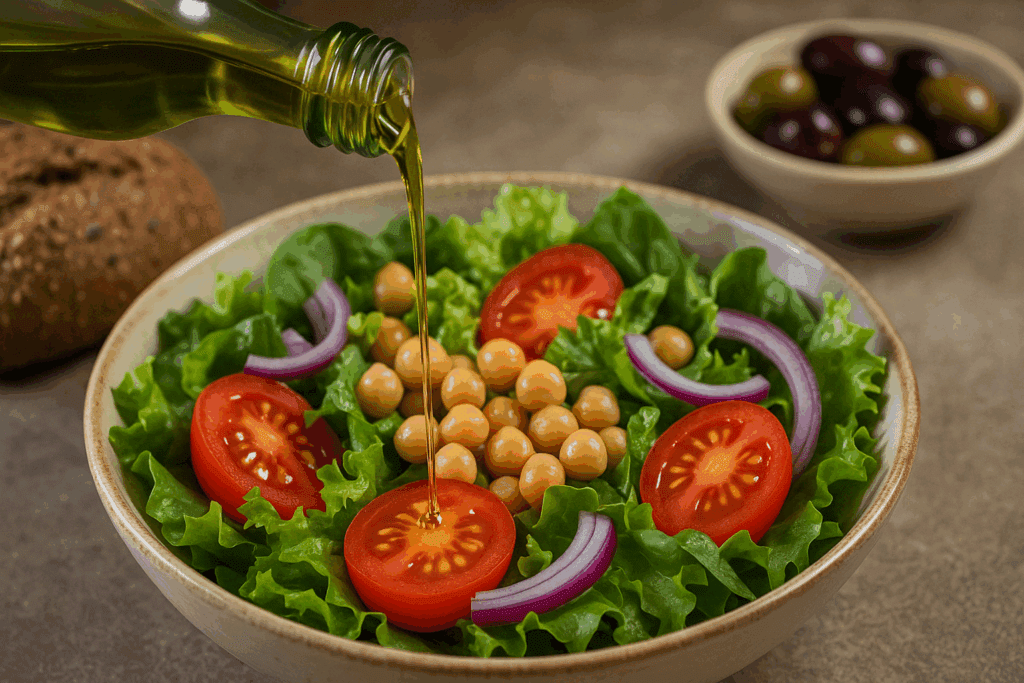
Determining How Much Olive Oil Per Day in the Mediterranean Diet
One of the most frequently asked questions about this dietary pattern is how much olive oil per day in the Mediterranean diet is actually recommended. While individual needs may vary based on caloric requirements, health goals, and activity levels, research generally supports the inclusion of approximately 2 to 4 tablespoons of extra virgin olive oil daily. In clinical trials, participants who benefited most from the olive oil diet consumed around 50 mL per day, which is slightly over 3 tablespoons.
This amount provides roughly 400 calories, yet it is considered a nutrient-dense source of those calories. The key is using olive oil not as an added fat in an already calorie-rich diet, but as a replacement for less healthy fats like butter or margarine. When used to sauté vegetables, dress salads, or finish soups and legumes, olive oil enhances both the flavor and nutritional profile of meals. Its antioxidant content, particularly from compounds like oleocanthal and hydroxytyrosol, adds to its anti-inflammatory and cardiovascular benefits.
To ensure optimal health outcomes, it’s essential to choose high-quality extra virgin olive oil, which is mechanically pressed and free from chemical processing. This type retains the highest levels of beneficial phenolic compounds. Consumers should look for olive oils with harvest dates and seals of authenticity from reputable regulatory bodies to ensure freshness and potency.
Exploring the Science Behind the Olive Oil Diet
The concept of an olive oil diet extends beyond the boundaries of Mediterranean cuisine. As an anchor of this eating style, olive oil has been studied independently and in conjunction with other foods. Researchers have found that even modest increases in olive oil consumption, when paired with a whole-food diet rich in vegetables and legumes, can reduce markers of oxidative stress and insulin resistance. For individuals seeking to improve metabolic flexibility, incorporating olive oil in place of processed oils or animal fats can serve as a strategic intervention.
Olive oil also supports gut health by promoting the growth of beneficial microbiota. Its polyphenols act as prebiotics, selectively nourishing strains of bacteria associated with improved digestion and immunity. Emerging research even suggests a potential neuroprotective role for olive oil, as populations with high olive oil intake tend to experience lower rates of age-related cognitive decline and neurodegenerative diseases like Alzheimer’s.
Moreover, olive oil enhances the bioavailability of fat-soluble nutrients such as vitamins A, D, E, and K. When used in combination with leafy greens, tomatoes, or carrots, it helps the body absorb carotenoids and other antioxidants more efficiently. This synergistic effect makes the olive oil diet particularly powerful, as it amplifies the health benefits of plant-based foods that are otherwise low in fat.
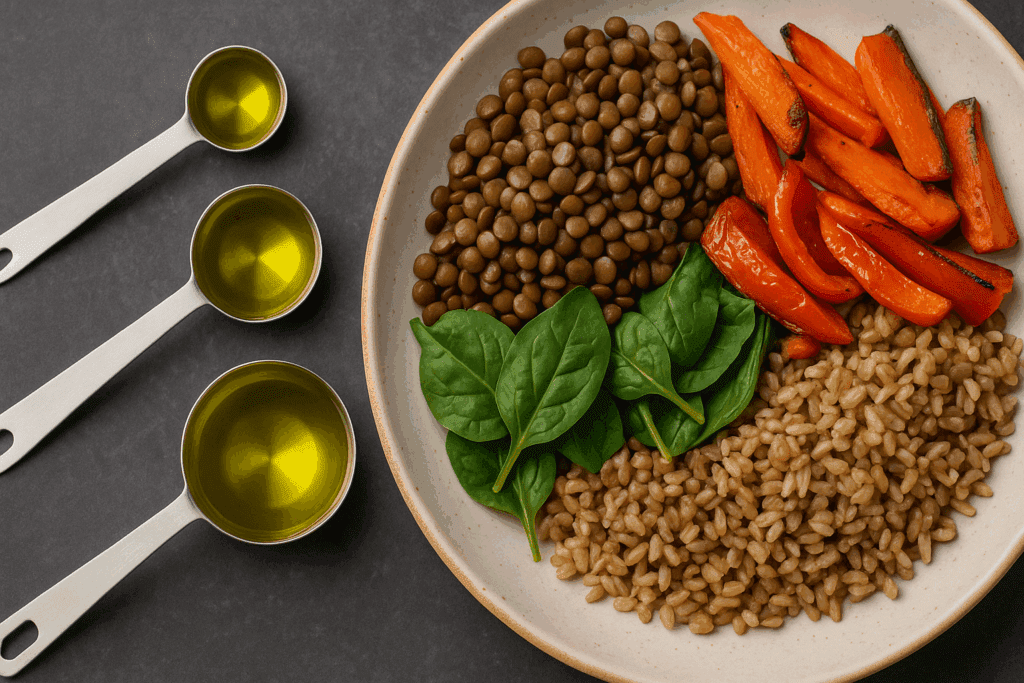
Is Cottage Cheese on the Mediterranean Diet?
Another common inquiry concerns the place of dairy in this dietary model, particularly regarding cottage cheese. The Mediterranean diet is traditionally lower in dairy than Western diets, emphasizing fermented dairy like yogurt and aged cheeses such as feta or Parmigiano-Reggiano. However, the question remains: is cottage cheese on the Mediterranean diet? The answer depends on interpretation, regional variation, and modern adaptations.
While not a staple of the traditional Mediterranean table, cottage cheese can be included in a Mediterranean-inspired diet when consumed in moderation and chosen carefully. It offers a good source of high-quality protein, calcium, and B vitamins, and it is relatively low in fat compared to many aged cheeses. For individuals looking to increase their protein intake while maintaining a plant-forward eating style, incorporating cottage cheese a few times per week can be a strategic choice.
When selecting cottage cheese, opt for versions with minimal added salt and no artificial additives. Organic or grass-fed varieties may offer a more favorable fatty acid profile, including higher levels of omega-3s. Those with lactose sensitivity may want to choose lactose-free options or limit their portion size to minimize digestive discomfort. Including cottage cheese in meals with vegetables, whole grains, or fruits helps maintain the integrity of the Mediterranean framework, which prioritizes nutrient-dense, whole foods in balanced proportions.
Can You Eat Cottage Cheese on the Mediterranean Diet Without Compromising Its Benefits?
For those following a Mediterranean diet with olive oil as a primary fat source, the addition of cottage cheese may seem at odds with tradition. However, dietary flexibility and cultural adaptation are part of what makes the Mediterranean approach so sustainable. The key lies in moderation and context. Can you eat cottage cheese on the Mediterranean diet without undermining its health benefits? The answer is yes—when integrated mindfully.
Cottage cheese can complement the Mediterranean pattern when it replaces more processed, high-sodium cheeses or when it is used as a protein source in plant-rich meals. For instance, a bowl of lentils, cherry tomatoes, olive oil, and a dollop of cottage cheese creates a satisfying, balanced meal that aligns with Mediterranean principles. The emphasis should always remain on whole foods, variety, and the overall dietary pattern rather than strict adherence to traditional foods.
Recent adaptations of the Mediterranean diet, particularly in non-Mediterranean countries, often include local foods that fit the nutritional profile of traditional items. As long as cottage cheese does not crowd out more foundational elements like olive oil, vegetables, legumes, and whole grains, it can be part of a healthy, sustainable routine. This approach respects both the spirit and science of the Mediterranean lifestyle.

Balancing Olive Oil and Cottage Cheese in a Modern Mediterranean Diet
Creating a modern Mediterranean diet with olive oil and cottage cheese requires thoughtful meal planning and awareness of nutritional balance. Olive oil should remain the primary fat source, used generously but within caloric needs. Cottage cheese, while not a daily staple, can be included strategically to enhance satiety and support protein needs, especially for active individuals or those over 50 who may require more protein to preserve lean muscle mass.
A balanced day might include oatmeal with fruit and a drizzle of olive oil for breakfast, a chickpea and vegetable salad with an olive oil-based vinaigrette for lunch, and a dinner of roasted vegetables and whole grains with a small side of cottage cheese. The combination supports blood sugar regulation, cardiovascular health, and digestive wellness while maintaining variety and flavor. Adding herbs, lemon juice, garlic, or other Mediterranean seasonings elevates the experience while increasing antioxidant intake.
This flexibility is essential in real-world settings, where dietary adherence depends not only on nutritional science but also on enjoyment, accessibility, and personal preferences. By framing olive oil and cottage cheese as complementary rather than competing elements, individuals can design a Mediterranean-inspired diet that supports long-term wellness without sacrificing satisfaction or cultural relevance.
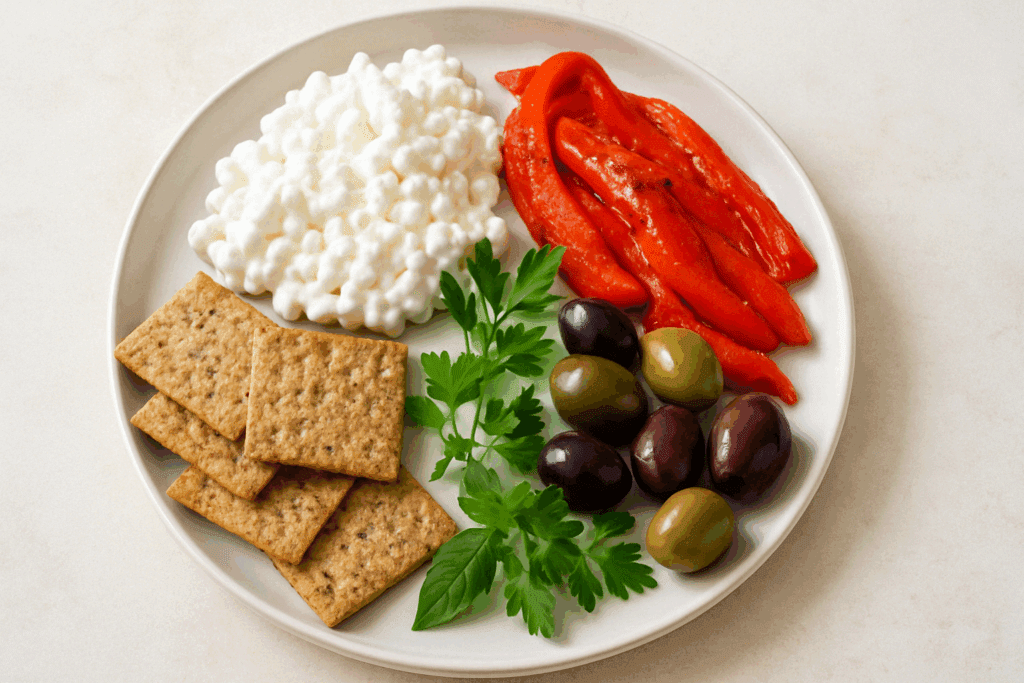
Practical Tips for Implementing the Mediterranean Diet with Olive Oil and Cottage Cheese
Adopting a Mediterranean diet with olive oil and cottage cheese starts with choosing whole, minimally processed foods and building meals around plant-based staples. Stock your kitchen with extra virgin olive oil, legumes, whole grains like farro and quinoa, nuts, seeds, and a variety of seasonal fruits and vegetables. Use olive oil as your go-to fat for both cooking and flavoring, and consider incorporating it into sauces, marinades, and dressings.
For those interested in adding cottage cheese, use it as a versatile protein addition in grain bowls, vegetable wraps, or fruit-based snacks. Try blending it into dips with herbs and olive oil for a creamy, nutrient-dense alternative to sour cream or mayonnaise. Cottage cheese can also pair well with savory dishes like roasted red peppers and olives or be enjoyed with a drizzle of honey and a sprinkle of walnuts for a balanced dessert.
Meal prep can also play a critical role. Preparing olive oil-based salad dressings in advance or roasting a batch of vegetables for the week ensures that nutrient-rich choices are always within reach. Keep portion sizes in mind: 1/2 cup of low-sodium cottage cheese provides approximately 13 grams of protein, while 1 tablespoon of olive oil contains about 120 calories and 14 grams of fat. These quantities support satiety and metabolic health without exceeding energy needs.
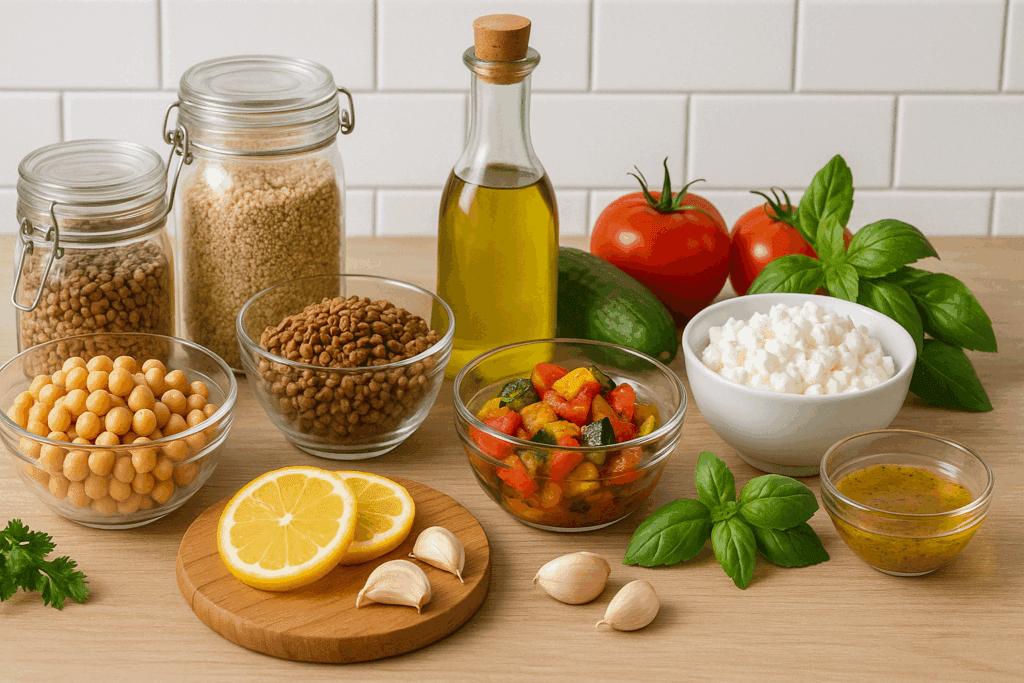
Frequently Asked Questions (FAQ): Mediterranean Diet with Olive Oil and Cottage Cheese
1. Can olive oil be used for cooking every day in a Mediterranean diet without compromising its health benefits?
Yes, olive oil can be used daily in cooking as part of a Mediterranean diet, especially when used properly to preserve its nutrients. While extra virgin olive oil retains more antioxidants and polyphenols when used in cold dishes or low-heat cooking, recent research suggests it is more stable than previously believed even during moderate heat exposure. This supports the broader idea of an olive oil diet being practical in everyday home kitchens, not just for salads. For those wondering how much olive oil per day in Mediterranean diet settings is ideal, using 1 to 2 tablespoons throughout the day in meals remains both beneficial and safe. Ultimately, cooking with olive oil aligns with the foundational principles of the Mediterranean diet with olive oil as a primary fat source, contributing to better cardiovascular and cognitive outcomes over time.
2. Is there a difference between incorporating olive oil in raw dishes versus cooked meals in terms of nutritional impact?
There is a subtle but important difference. Raw olive oil, particularly extra virgin, maintains its full spectrum of polyphenols, vitamin E, and flavor compounds when drizzled over cold dishes or used in dressings. When olive oil is heated, some of these antioxidants degrade, though not as significantly as once believed. A Mediterranean diet with olive oil includes both raw and cooked uses, so alternating between the two allows for variety and nutritional balance. For those following an olive oil diet, this mix enhances satiety and flavor while preserving many of the oil’s anti-inflammatory benefits. Therefore, whether sautéing vegetables or dressing a bean salad, you’re still supporting your health—just in slightly different ways.
3. How much olive oil per day in Mediterranean diet practice is too much for weight management?
While olive oil is heart-healthy, it’s still a calorie-dense food, containing about 120 calories per tablespoon. For those mindful of their weight, the sweet spot typically falls between 1 to 2 tablespoons per day. Exceeding this range regularly may tip the balance toward excess calorie intake, particularly if other high-fat foods are included. In a traditional Mediterranean diet with olive oil, the focus is on using fat sparingly to enhance the flavor of whole foods, not to drench them. The key is moderation—using just enough olive oil to create richness and satiety without turning meals into overly fatty dishes. Integrating olive oil as part of an overall plant-forward, fiber-rich diet helps regulate appetite and supports metabolic health.
4. Can you eat cottage cheese on Mediterranean diet plans that are dairy-inclusive?
Yes, cottage cheese can be included in Mediterranean-style eating patterns that allow for moderate dairy intake, especially if the focus is on fermented or high-protein options. However, the type of cottage cheese matters. Opt for low-fat or reduced-sodium varieties made from grass-fed or organic milk when possible, as these align better with the quality principles of this diet. When asking is cottage cheese on the Mediterranean diet, it’s important to recognize that while it’s not a staple, it can serve as a convenient protein source in balanced meals. Including cottage cheese occasionally—as part of a breakfast with fresh fruit or in a lunch bowl with vegetables and olive oil—can diversify nutrient intake while keeping saturated fat in check.
5. How does cottage cheese compare to Greek yogurt in a Mediterranean-style eating pattern?
Greek yogurt is often emphasized more prominently in Mediterranean diets due to its fermentation benefits, probiotic content, and traditional use. However, cottage cheese offers a comparable protein profile and can serve as a satisfying, lower-lactose alternative for those who don’t tolerate yogurt well. Both can support the inclusion of dairy in a nutrient-dense way, as long as they’re not overly processed or high in added sodium. Asking can you eat cottage cheese on Mediterranean diet meals invites flexibility: while it might not carry the same cultural legacy as Greek yogurt, it fulfills similar nutritional roles. For those following a Mediterranean diet with olive oil, pairing either dairy food with healthy fats and fiber-rich ingredients helps maintain the balance of this eating style.
6. Are there any long-term health implications of following an olive oil diet daily?
The long-term effects of an olive oil diet, particularly one anchored in extra virgin olive oil, are overwhelmingly positive when paired with a whole-food Mediterranean approach. Clinical trials such as the PREDIMED study have shown significant reductions in cardiovascular events among participants who used olive oil liberally—up to four tablespoons daily—while following other tenets of the Mediterranean diet. This reinforces the idea that how much olive oil per day in Mediterranean diet contexts may vary based on individual needs and overall dietary structure. However, to prevent imbalances, olive oil should be viewed as a complement to fiber-rich plant foods rather than a stand-alone solution. Over time, this combination supports healthy cholesterol levels, insulin sensitivity, and even cognitive function.
7. What’s the best way to introduce cottage cheese into a Mediterranean eating routine for someone new to the diet?
Start with simplicity. Add cottage cheese to a fresh tomato and cucumber salad with a drizzle of extra virgin olive oil, sprinkle of herbs, and cracked black pepper. This creates a dish that bridges tradition and modern adaptation. If you’re exploring is cottage cheese on the Mediterranean diet as a lifestyle, it’s wise to integrate it slowly, focusing on pairing it with whole foods typical of the region—like olives, lentils, and whole grains. Those asking can you eat cottage cheese on Mediterranean diet plans can experiment with it in breakfast bowls or savory dips. Its mild taste and creamy texture make it an excellent vessel for Mediterranean flavors, especially when paired with fresh herbs and olive oil.
8. How can olive oil intake be adjusted based on lifestyle factors such as athletic training or aging?
Individuals with higher energy needs—such as athletes or very active adults—can usually handle a higher intake of olive oil without compromising weight or nutrient balance. In these cases, how much olive oil per day in Mediterranean diet planning may expand to three or even four tablespoons, especially if meals are otherwise low in added fats. For older adults, moderate olive oil consumption can support cognitive aging and joint health due to its anti-inflammatory compounds. Incorporating a Mediterranean diet with olive oil allows customization: olive oil becomes a tool to enhance caloric density and support nutrient absorption without relying on less healthy fats. Adjusting based on age, metabolism, and health status keeps this traditional dietary pattern flexible and effective.
9. What are creative ways to use olive oil outside of traditional meals in an olive oil diet?
Beyond dressings and sautés, olive oil can be infused with herbs for dipping sauces, blended into hummus for a silky texture, or drizzled over roasted fruits for a savory-sweet dessert. In an olive oil diet, these creative approaches help break monotony and add gourmet appeal without compromising health. Some even use high-quality olive oil in baking, replacing butter in cakes and muffins for a more heart-friendly fat source. When following a Mediterranean diet with olive oil at its center, these less conventional uses provide variety while honoring the fat’s nutritional role. Small innovations like these also make it easier to stick with the lifestyle long-term, especially when cooking for family or entertaining guests.
10. Should people with lactose intolerance avoid cottage cheese even if they’re on a Mediterranean diet?
Not necessarily. Many people with lactose intolerance can tolerate small amounts of dairy, especially fermented or lower-lactose options like cottage cheese. Some brands offer lactose-free versions, while others use cultures that naturally reduce lactose content. When exploring can you eat cottage cheese on Mediterranean diet plans, those with sensitivities should begin with small portions and monitor how they feel. While is cottage cheese on the Mediterranean diet remains a question of personal tolerance and preference, it’s possible to enjoy this food as part of a broader, inclusive diet that prioritizes gut health and diversity. It’s also worth noting that pairing cottage cheese with fiber-rich foods and fermented vegetables may help mitigate digestive discomfort, making it more accessible even to sensitive individuals.
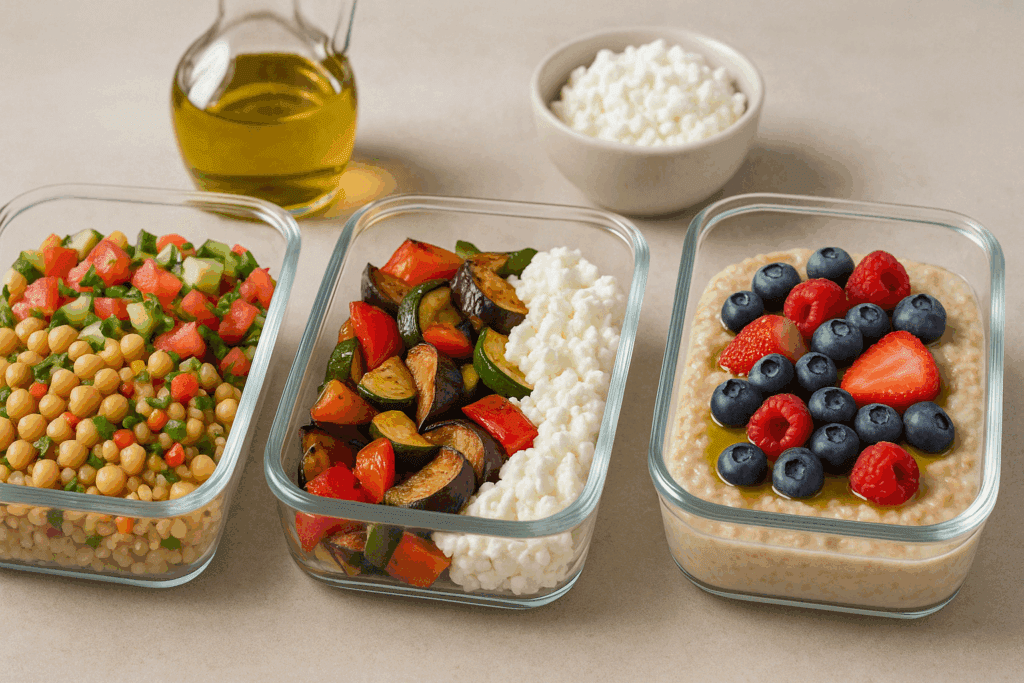
Conclusion: Crafting a Sustainable Mediterranean Diet with Olive Oil and Cottage Cheese
The Mediterranean diet continues to earn its reputation as a gold standard for healthy eating, with robust scientific evidence supporting its role in reducing chronic disease, enhancing longevity, and improving overall quality of life. Central to this lifestyle is the generous use of extra virgin olive oil, a nutritional powerhouse that offers heart-protective monounsaturated fats and a rich profile of polyphenols. Understanding how much olive oil per day in the Mediterranean diet is ideal—typically around 2 to 4 tablespoons—can help individuals achieve the diet’s full health potential.
At the same time, questions like “is cottage cheese on the Mediterranean diet” or “can you eat cottage cheese on Mediterranean diet” reflect the evolving nature of dietary patterns in modern times. While cottage cheese may not have been part of the traditional Mediterranean table, its nutritional profile makes it a viable addition for those seeking flexibility without compromising health. When incorporated with mindfulness and balance, cottage cheese can complement the core tenets of the Mediterranean approach.
Ultimately, the Mediterranean diet with olive oil and cottage cheese represents a modern, practical, and science-backed way to eat for health and enjoyment. By focusing on whole foods, using olive oil as a foundation, and incorporating adaptable elements like cottage cheese thoughtfully, individuals can build a diet that supports long-term well-being, sustainability, and satisfaction. This harmonious blend of tradition and innovation ensures that the Mediterranean diet remains both timeless and timely in the ever-evolving landscape of nutritional health.
Was this article helpful? Don’t let it stop with you. Share it right now with someone who needs to see it—whether it’s a friend, a colleague, or your whole network. And if staying ahead on this topic matters to you, subscribe to this publication for the most up-to-date information. You’ll get the latest insights delivered straight to you—no searching, no missing out.
Further Reading:
Mediterranean diet for heart health
Mediterranean Diet 101: A Meal Plan and Beginner’s Guide
Disclaimer
The information contained in this article is provided for general informational purposes only and is not intended to serve as medical, legal, or professional advice. While NewsHealthWatch strives to present accurate, up-to-date, and reliable content, no warranty or guarantee, expressed or implied, is made regarding the completeness, accuracy, or adequacy of the information provided. Readers are strongly advised to seek the guidance of a qualified healthcare provider or other relevant professionals before acting on any information contained in this article. NewsHealthWatch, its authors, editors, and contributors expressly disclaim any liability for any damages, losses, or consequences arising directly or indirectly from the use, interpretation, or reliance on any information presented herein. The views and opinions expressed in this article are those of the author(s) and do not necessarily reflect the official policies or positions of NewsHealthWatch.

